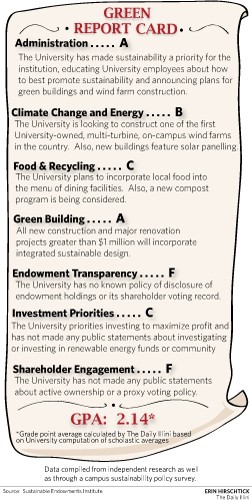UI yields mediocre report card scores

Source: Sustainable Endowments Institute. Dats compiled from independent research as well as through a campus sustainability policy survey. Erin Hirschtick
Feb 9, 2007
Last updated on May 12, 2016 at 07:49 a.m.
The report card is in, and the University has received a “C” in environmental sustainability. The Sustainable Endowments Institute of Cambridge, Mass., released a “College Sustainability Report Card” concerning “campus greening practices and endowment policies” for 100 leading colleges. The University was one of 54 schools to earn the grade.
The highest grade attained by any school was an “A-” overall, awarded to schools such as Harvard University and Dartmouth College.
The University received an “A” grade in administration and green building. According to the report, the University of Illinois administration has made sustainability a priority, and taken the proper steps to implement President B. Joseph White’s call for sustainability.
However, the University also received an “F” grade in “endowment transparency” and “shareholder engagement.” According to the report, “the University has no known policy of disclosure of endowment holdings or its shareholder voting record,” nor has it “made any public statements about active ownership.”
Get The Daily Illini in your inbox!
The University earned its “A” grades, said Bill Sullivan, director of the Environmental Council and professor in natural resources.
“The (“B” grade) in climate change is where we are, but we’re getting better,” he said. And the BP alternative fuel research program, which the University has recently entered into, should greatly enhance this.
“The opportunity to work with our partners at Berkeley presents a really exciting opportunity for us,” he said. This is especially vital because Illinois has a very rural and farming-based economy, he added.
When asked about recycling, Sullivan said, “If you come back in a year or two, you’ll see that vastly improved.”
Years ago, the University had a compost plan but it “fizzled out,” said Lisa Merrifield, spokeswoman for the Environmental Council.
“Facilities and services does have a fairly good recycling program,” she said.
Sullivan added that there has not been “a lot of innovation” regarding recycling on campus. Greater education and publicity would help alleviate this problem.
“I don’t think a lot of people know how to recycle,” Sullivan said, “or how the waste transfer center works.”
The University is constructing a wind farm to provide 2.7 percent of the school’s energy.
The new Business Instructional Facility, being built at the corner of Gregory and Sixth streets, was commended for its aim to earn LEED Gold Certification, a nationally recognized certification for “green” buildings.
“There’s a lot more we can do on this campus,” Merrifield said. “Even simple changes, like turning a light off or turning the heat down can make a big difference. There are enough people here that even small changes can greatly reduce our carbon footprint.”
Green development and research has benefits beyond environmental concerns, Sullivan said.
“The more we can rely on local alternative energy resources to meet our energy needs,” Sullivan said, “the better off we’re going to be from an environmental and geopolitical standpoint.”





